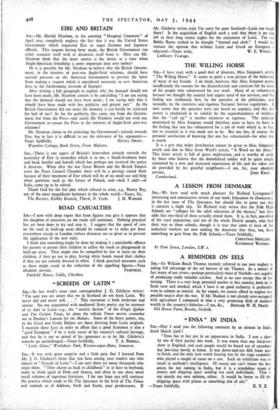EIRE AND BRITAIN
SIR,—Mr. Harold Nicolson, in his amazing "Marginal Comment" of April 21st, completely neglects the fact that it was the United States Government which requested Eire to expel German and Japanese officials. This request having been made, the British Government can either associate itself with or dissociate itself from it. How can Mr. Nicolson think that the latter course is the better at a time when Anglo-American friendship is more important than ever before?
Or is it possible for Mr. Nicolson to believe that the British Govern- ment, in the interests of post-war Anglo-Irish relations, should have exerted pressure on the American Government to prevent the latter from making a request which it considered necessary to save American lives in the forthcoming invasion of Europe?
After writing a full paragraph to explain why the demand should not have been made, Mr. Nicolson cancels it by concluding "I am not saying that the demand should not have been made ; I am saying only that it should have been made with less publicity and greater tact." As the British Government did not make the demand, it can hardly be criticised for lack of tact! As for the publicity, this came, not from the Govern- ment, but from the Press—and surely Mr Nicolson would not wish our Government to censor the Press in the interests of Anglo-Irish post-war relations!
Mr. Nicolson claims to be criticising the Government's attitude towards Eire, but in fact it is difficult to see the relevance of his arguments.— Yours faithfully, NEVILL ORGEL. Waterloo Cottage, Bank Street, Great Malvern.






















 Previous page
Previous page